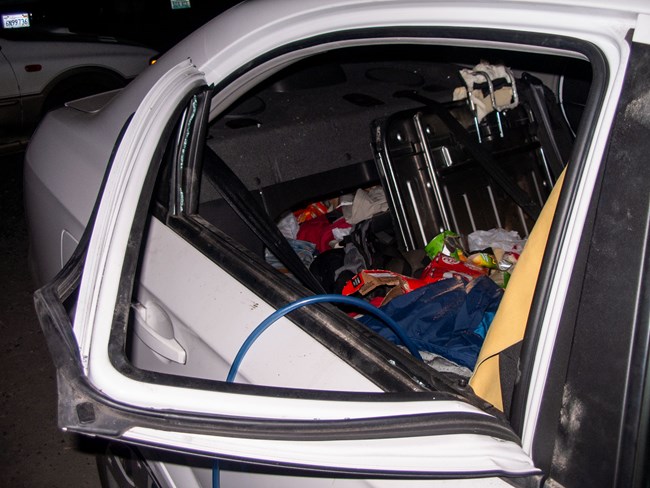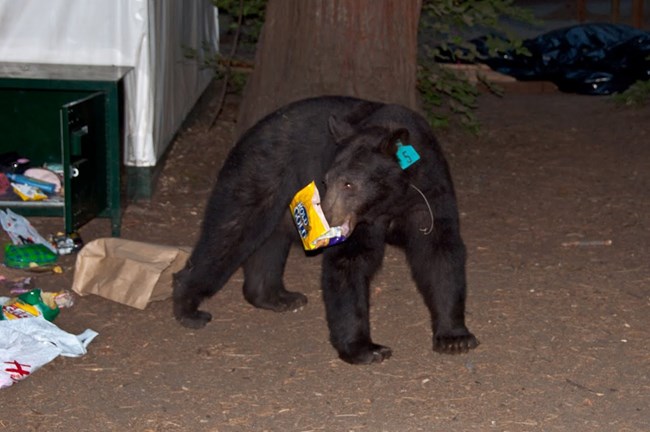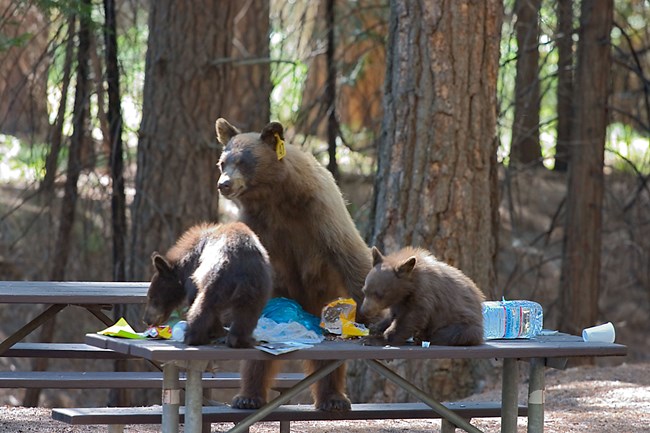
Exciting? Scary? Tragic? All of these describe the situation. Bears that frequently get human food often lose their fear of people and then end up being killed to protect people. Keep reading to learn how you can help protect Yosemite bears. © Jeffrey Brooker Yosemite National Park is home to hundreds of American black bears; these bears have a voracious appetite. They also are incredibly curious and have an amazing sense of smell. This combination tempts them to seek our high-calorie food. Sometimes bears that routinely get our food become aggressive, and sometimes have to be killed as a result. By storing your food properly, you can prevent a bear's unnecessary death. Please note that these food storage regulations have the force and effect of federal law: Failure to store your food properly may result in impoundment of your food or car and/or a fine of up to $5,000 and/or removal from your campsite or lodging facility. 
What is Food?"Food" includes any item with a scent, regardless of packaging. This may include items that you do not consider food, such as
All these items must be stored properly. How to Store Your FoodCars, Trucks, and RVsDuring daylight hours only, you may store food inside your car or truck (out of sight, with windows completely closed). Do not leave food in a pickup truck bed or strapped to the outside of a vehicle at any time. Do not store food in your car (including trunk) or truck after dark: use a food locker. Remember to clear your car of food wrappers, crumbs in baby seats, and baby wipes--and even canned food and drinks. Think about packing all your food and related items together for easy removal from your car upon arriving in Yosemite. Food lockers are available at Curry Village parking lots and at nearly all trailhead parking areas. You may store food out of sight in hard-sided trailers and RVs, as long as windows, doors, and vents are closed when you're not there. Hard-sided RVs are those made entirely of solid, non-pliable material (e.g., no cloth pop-outs) Food may not be stored in pop-up or tent trailers, or other soft-sided campers. 
© Ross J. Guscette (via Creative Commons CC BY-NC-ND) Campgrounds, Housekeeping Camp, and Curry Village Tent CabinsYou must store all your food in food lockers. Bears may enter campsites even in your presence (see photo above), and some will even check lockers to see if they’re latched.
Food lockers are available at every campsite, Housekeeping unit, and Curry Village tent cabin. You may store food out of sight in hard-sided trailers and RVs, as long as windows, doors, and vents are closed when you're not there. Hard-sided RVs are those made entirely of solid, non-pliable material (e.g., no cloth pop-outs) Food may not be stored in pop-up or tent trailers, or other soft-sided campers. Hotel Rooms and CabinsYou must keep all food inside your room; if you are not in the room, the windows and doors must be closed. Bears can easily break into cabins through an open door or open window. 
© Sean Crom Picnicking and HikingAlways keep your food within arm's reach and don't turn your back to your food; never leave food unattended. Bears may investigate picnic areas or backpacks for food even in your presence, so be alert. Backpacking in the WildernessBear resistant food containers ("bear canisters") are required for overnight hikers throughout the wilderness (counterbalance food hangs are no longer legal). In Yosemite and the southern Sierra, bear canisters are the only effective and proven method of preventing bears from getting human food. Bear EncountersIf you see a bear outside of developed areas, keep your distance: Remain at least 50 yards (four shuttle bus lengths). If you see a bear in a developed area or if a bear approaches you, scare it away by yelling very loudly and aggressively. Find out more about what to do if you see a bear. |
Last updated: March 14, 2024
